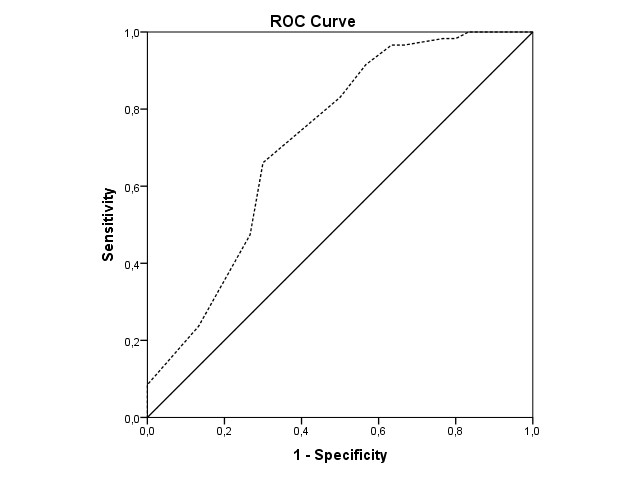Category: Rating Scales
Objective: The aim of this study is to evaluate the accuracy (sensitivity and specificity) of Frontal Assessment Battery (FAB) for detecting executive deficits in a Cuban sample of patients with Parkinson’s disease (PD) who have mild cognitive impairment (PD-MCI).
Background: MCI related to Parkinson’s disease (MCI-PD) has a prevalence between 15% and 30% [1]. PD-MCI patients have an increased risk of developing dementia compared to cognitively intact PD patients [2]. Early diagnosis of pathological cognitive decline becomes increasingly important in providing patients with the necessary interventions. Frontal Assessment Battery (FAB) is a frequently used instrument to explore frontal dysfunctions in different pathologies. The FAB is used fundamentally for the early detection of executive dysfunctions in different diseases that affect the frontostriate brain circuits [3]. In the Cuban context, the use of FAB in MCI-PD patients would allow early detection of cognitive dysfunction and could help to delineate prevention strategies from a multidisciplinary point of view.
Method: The FAB were administered to 30 PD-MCI patients and 32 cognitively intact PD patients. None of the participants included in the study showed clinical signs of depression (Geriatric Depression Scale < 5) or anxiety (Zung Scale < 51). Additionally, all the PD patients were preserved in activities of daily living. The gold standard for patients’ selection was level II diagnosis of PD-MCI according to consensus criteria of the International Parkinson and Movement Disorder Society [4]. We evaluated five cognitive domains: memory, attention /working memory, language, visuospatial and executive, using two tests for each cognitive domain. To evaluate the accuracy of FAB sensitivity and specificity were determined using ROC analysis.
Results: When comparing MCI-PD patients with the control group (cognitively intact PD patients), using the FAB, the area under the ROC curve (AUC) was .72 (cut-off= 10/11; sensitivity = .85; specificity = .66) [figure 1].
Conclusion: Our results showed that Frontal Assessment Battery (FAB) is suitable for distinguishing PD-MCI patients from cognitively intact PD patients. The use of FAB in the Cuban clinical context will allow early detection of executive deficits in Parkinson’s patients.
References: 1. Litvan I, Aarsland D, Adler CH, Goldman JG, Kulisevsky J, Mollenhauer B, et al. MDS task force on mild cognitive impairment in Parkinson’s disease: Critical review of PD-MCI. Mov Disord 2011;26(10):1814–24. doi: 10.1002/mds.23823 2. Goldman JG, Vernaleo BA, Camicioli R, Dahodwala N, Dobkin RD, Ellis RD, et al. Cognitive impairment in Parkinson’s disease: a report from a multidisciplinary symposium on unmet needs and future directions to maintain cognitive health. npjParkinson’s Disease 2018;4(19). doi: 10.1038/s41531-018-0055-3 3. Kopp B, Rosser N, Tabeling S. Performance on the Frontal Assessment Battery is sensitive to frontal lobe damage in stroke patients. BMC Neurology. 2013;13(179). doi: 10.1186/1471-2377-13-179 4. Goldman JG, Holden S, Ouyang B, Bernard B, Goetz CG, Stebbins GT. Diagnosing PD-MCI by MDS Task Force criteria: how many and which neuropsychological tests? Mov Disord. 2015; 30(3):402-6. doi: 10.1002/mds.26084.
To cite this abstract in AMA style:
Y. Broche-Pérez, E. Jiménez-Puig, Z. Fernández-Fleites, S. Morales-Ortiz, LR. Crespo-Rodríguez. Accuracy of Frontal Assessment Battery to detect Mild Cognitive Impairment in a Cuban sample of Parkinson’s disease patients [abstract]. Mov Disord. 2021; 36 (suppl 1). https://www.mdsabstracts.org/abstract/accuracy-of-frontal-assessment-battery-to-detect-mild-cognitive-impairment-in-a-cuban-sample-of-parkinsons-disease-patients/. Accessed January 1, 2026.« Back to MDS Virtual Congress 2021
MDS Abstracts - https://www.mdsabstracts.org/abstract/accuracy-of-frontal-assessment-battery-to-detect-mild-cognitive-impairment-in-a-cuban-sample-of-parkinsons-disease-patients/

